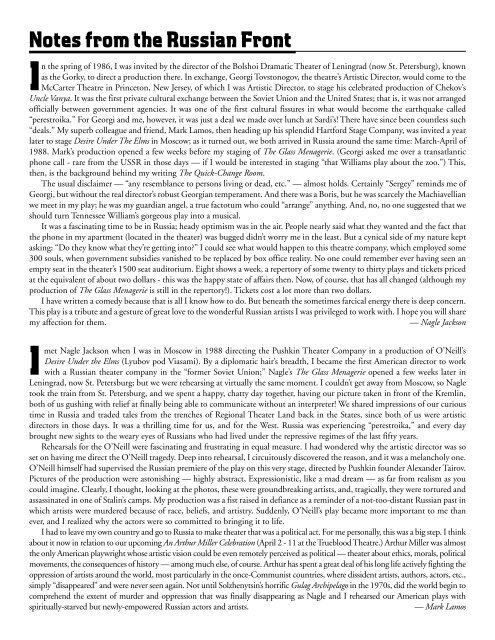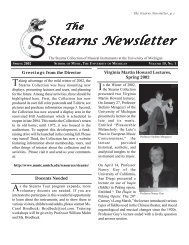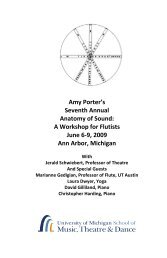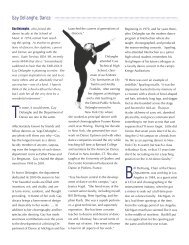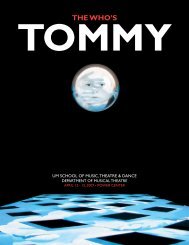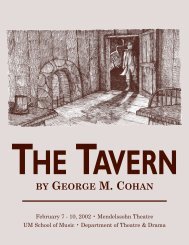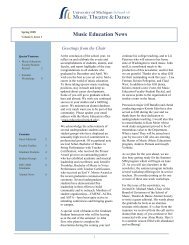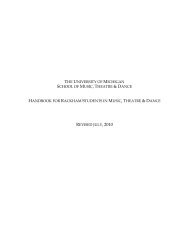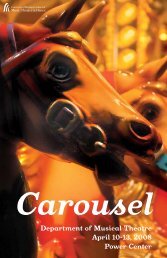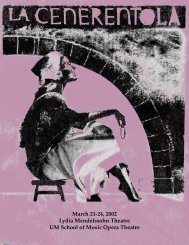07 - quick change room prog - University of Michigan School of Music
07 - quick change room prog - University of Michigan School of Music
07 - quick change room prog - University of Michigan School of Music
Create successful ePaper yourself
Turn your PDF publications into a flip-book with our unique Google optimized e-Paper software.
Notes from the Russian Front<br />
In the spring <strong>of</strong> 1986, I was invited by the director <strong>of</strong> the Bolshoi Dramatic Theater <strong>of</strong> Leningrad (now St. Petersburg), known<br />
as the Gorky, to direct a production there. In ex<strong>change</strong>, Georgi Tovstonogov, the theatre’s Artistic Director, would come to the<br />
McCarter Theatre in Princeton, New Jersey, <strong>of</strong> which I was Artistic Director, to stage his celebrated production <strong>of</strong> Chekov’s<br />
Uncle Vanya. It was the first private cultural ex<strong>change</strong> between the Soviet Union and the United States; that is, it was not arranged<br />
<strong>of</strong>ficially between government agencies. It was one <strong>of</strong> the first cultural fissures in what would become the earthquake called<br />
“perestroika.” For Georgi and me, however, it was just a deal we made over lunch at Sardi’s! There have since been countless such<br />
“deals.” My superb colleague and friend, Mark Lamos, then heading up his splendid Hartford Stage Company, was invited a year<br />
later to stage Desire Under The Elms in Moscow; as it turned out, we both arrived in Russia around the same time: March-April <strong>of</strong><br />
1988. Mark’s production opened a few weeks before my staging <strong>of</strong> The Glass Menagerie. (Georgi asked me over a transatlantic<br />
phone call - rare from the USSR in those days — if I would be interested in staging “that Williams play about the zoo.”) This,<br />
then, is the background behind my writing The Quick-Change Room.<br />
The usual disclaimer — “any resemblance to persons living or dead, etc.” — almost holds. Certainly “Sergey” reminds me <strong>of</strong><br />
Georgi, but without the real director’s robust Georgian temperament. And there was a Boris, but he was scarcely the Machiavellian<br />
we meet in my play; he was my guardian angel, a true factotum who could “arrange” anything. And, no, no one suggested that we<br />
should turn Tennessee William’s gorgeous play into a musical.<br />
It was a fascinating time to be in Russia; heady optimism was in the air. People nearly said what they wanted and the fact that<br />
the phone in my apartment (located in the theater) was bugged didn’t worry me in the least. But a cynical side <strong>of</strong> my nature kept<br />
asking: “Do they know what they’re getting into?” I could see what would happen to this theatre company, which employed some<br />
300 souls, when government subsidies vanished to be replaced by box <strong>of</strong>fice reality. No one could remember ever having seen an<br />
empty seat in the theater’s 1500 seat auditorium. Eight shows a week, a repertory <strong>of</strong> some twenty to thirty plays and tickets priced<br />
at the equivalent <strong>of</strong> about two dollars - this was the happy state <strong>of</strong> affairs then. Now, <strong>of</strong> course, that has all <strong>change</strong>d (although my<br />
production <strong>of</strong> The Glass Menagerie is still in the repertory!). Tickets cost a lot more than two dollars.<br />
I have written a comedy because that is all I know how to do. But beneath the sometimes farcical energy there is deep concern.<br />
This play is a tribute and a gesture <strong>of</strong> great love to the wonderful Russian artists I was privileged to work with. I hope you will share<br />
my affection for them. — Nagle Jackson<br />
I<br />
met Nagle Jackson when I was in Moscow in 1988 directing the Pushkin Theater Company in a production <strong>of</strong> O’Neill’s<br />
Desire Under the Elms (Lyubov pod Viasami). By a diplomatic hair’s breadth, I became the first American director to work<br />
with a Russian theater company in the “former Soviet Union;” Nagle’s The Glass Menagerie opened a few weeks later in<br />
Leningrad, now St. Petersburg; but we were rehearsing at virtually the same moment. I couldn’t get away from Moscow, so Nagle<br />
took the train from St. Petersburg, and we spent a happy, chatty day together, having our picture taken in front <strong>of</strong> the Kremlin,<br />
both <strong>of</strong> us gushing with relief at finally being able to communicate without an interpreter! We shared impressions <strong>of</strong> our curious<br />
time in Russia and traded tales from the trenches <strong>of</strong> Regional Theater Land back in the States, since both <strong>of</strong> us were artistic<br />
directors in those days. It was a thrilling time for us, and for the West. Russia was experiencing “perestroika,” and every day<br />
brought new sights to the weary eyes <strong>of</strong> Russians who had lived under the repressive regimes <strong>of</strong> the last fifty years.<br />
Rehearsals for the O’Neill were fascinating and frustrating in equal measure. I had wondered why the artistic director was so<br />
set on having me direct the O’Neill tragedy. Deep into rehearsal, I circuitously discovered the reason, and it was a melancholy one.<br />
O’Neill himself had supervised the Russian premiere <strong>of</strong> the play on this very stage, directed by Pushkin founder Alexander Tairov.<br />
Pictures <strong>of</strong> the production were astonishing — highly abstract, Expressionistic, like a mad dream — as far from realism as you<br />
could imagine. Clearly, I thought, looking at the photos, these were groundbreaking artists, and, tragically, they were tortured and<br />
assassinated in one <strong>of</strong> Stalin’s camps. My production was a fist raised in defiance as a reminder <strong>of</strong> a not-too-distant Russian past in<br />
which artists were murdered because <strong>of</strong> race, beliefs, and artistry. Suddenly, O’Neill’s play became more important to me than<br />
ever, and I realized why the actors were so committed to bringing it to life.<br />
I had to leave my own country and go to Russia to make theater that was a political act. For me personally, this was a big step. I think<br />
about it now in relation to our upcoming An Arthur Miller Celebration (April 2 - 11 at the Trueblood Theatre.) Arthur Miller was almost<br />
the only American playwright whose artistic vision could be even remotely perceived as political — theater about ethics, morals, political<br />
movements, the consequences <strong>of</strong> history — among much else, <strong>of</strong> course. Arthur has spent a great deal <strong>of</strong> his long life actively fighting the<br />
oppression <strong>of</strong> artists around the world, most particularly in the once-Communist countries, where dissident artists, authors, actors, etc.,<br />
simply “disappeared” and were never seen again. Not until Solzhenytsin’s horrific Gulag Archipelago in the 1970s, did the world begin to<br />
comprehend the extent <strong>of</strong> murder and oppression that was finally disappearing as Nagle and I rehearsed our American plays with<br />
spiritually-starved but newly-empowered Russian actors and artists. — Mark Lamos


